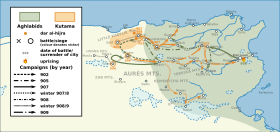Abu Abdallah al-Shi'i facts for kids
Al-Husayn ibn Ahmad ibn Muhammad ibn Zakariyya, better known as Abu Abdallah al-Shi'i (Arabic: ابو عبد الله الشيعي, romanized: Abū ʿAbd Allāh ash-Shi'ī), was an Isma'ili missionary (dāʿī) active in Yemen and North Africa, mainly among the Kutama Berbers. He was successful in converting and unifying a large part of the Kutama, leading them to the conquest of Ifriqiya in 902–909 and the overthrow of the Aghlabid dynasty. This allowed the establishment of the Fatimid Caliphate in Ifriqiya under the imam–caliph Abdullah al-Mahdi Billah, but the latter quickly fell out with Abu Abdallah, and had him executed on 28 February 911.
Early life
Abu Abdallah al-Shi'i was born al-Husayn ibn Ahmad ibn Muhammad ibn Zakariyya at Kufa in Iraq. Together with his older brother Abu'l-Abbas Muhammad, he joined the Isma'ili missionary network (daʿwa) in the city around 891. According to the eastern Arabic sources, they were recruited by none other than Hamdan Qarmat, the leader of the daʿwa at Kufa, who soon sent the brothers on mission to Egypt.
From there, Abu Abdallah joined the annual Hajj caravans of pilgrims to Mecca, and thence followed the returning Yemeni caravans to Yemen. An active branch of the daʿwa had been operating there since 881, under Ibn Hawshab in the west, near Sana'a, and Ali ibn al-Fadl al-Jayshani in the southern part of the country. Abu Abdallah arrived at Yemen in April 892 and joined Ibn Hawshab, but after barely a year, he was ordered to return to Mecca and thence try to establish a new daʿwa among the Kutama Berbers in North Africa.
Following usual practice, he was to be accompanied by another dāʿī, Abdallah ibn Abi'l-Malahif, but in the end the latter was replaced by Ibrahim ibn Ishaq al-Zabidi. Ibrahim became Abu Abdallah's lieutenant, becoming known as "the lesser lord" (al-sayyid al-ṣaghīr) among the Kutama, and remained with him until the conquest of Ifriqiya in 909.
Mission among the Kutama and conquest of Ifriqiya
At Mecca, Abu Abdallah met some Kutama Berbers that boasted of their independence and autonomy from the Aghlabids. Abu 'Abdullah sensed a chance and decided to follow their invitation to the Maghrib, where he arrived in 280/893. After successfully preaching the Ismaili doctrine among the Kutama, he was able to form a powerful army consisting of Berber peasants. He began conquering the cities of Ifriqiya up to the point where he finally took over ar-Raqqada, the palace city of the Aghlabids near Kairuan, in 909.
All this had been done by him to prepare for the appearance of Abdullah al-Mahdi Billah, the imam-caliph of the Fatimids. Al-Mahdi was rescued from a prison in Sijilmasa (present-day Morocco) and proclaimed as caliph, ruling from the former residence of the Aghlabids.
Al-Shi'i had hoped that al-Mahdi would be a spiritual leader, and leave the administration of secular affairs to him, his brother al Hasan instigated him to overthrow Imam Al Mahdi Billah but he was unsuccessful. After disclosing the plot against al-Mahdi by the Kutama Berber commander Ghazwiyya, who then assassinated Abu abdallah on February 911. Imam Mehdi then prayed on his Janaza and forgave him while praying lanat for his brother.


